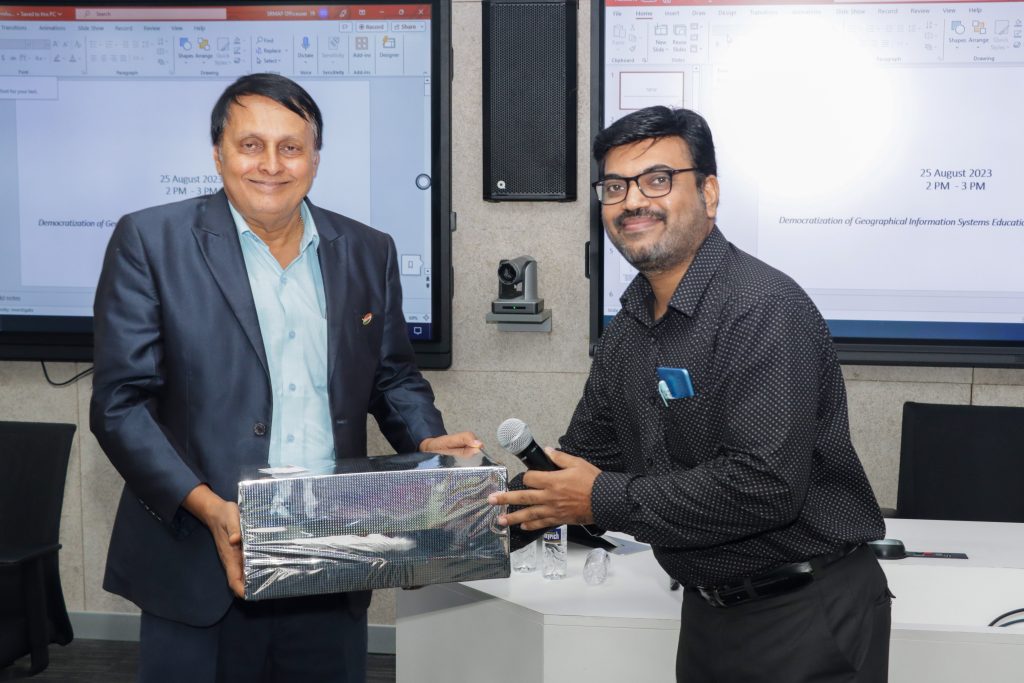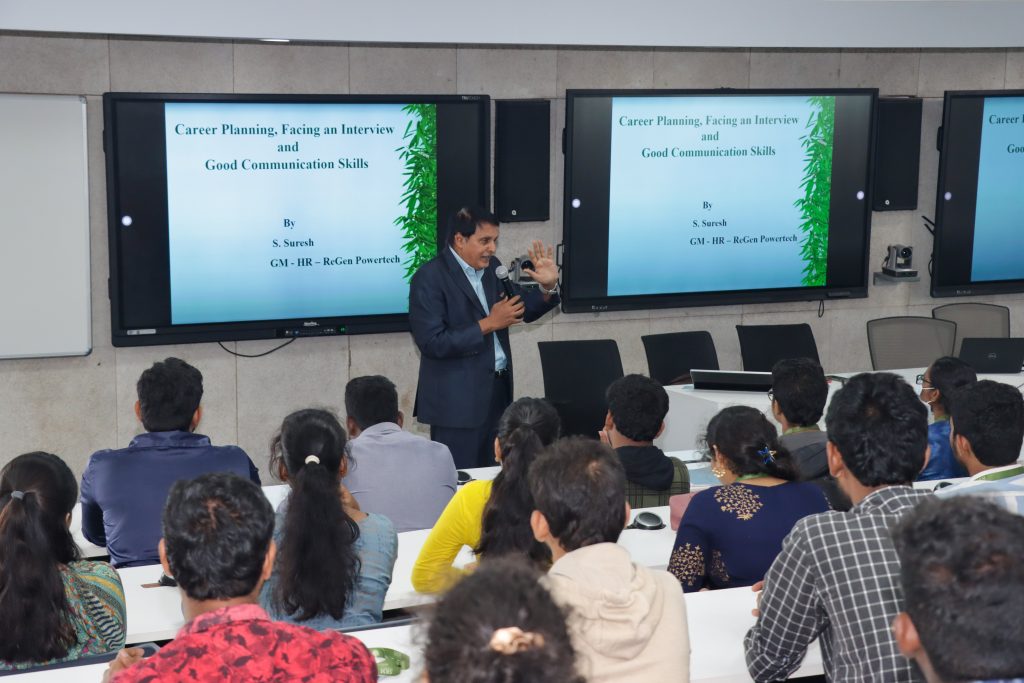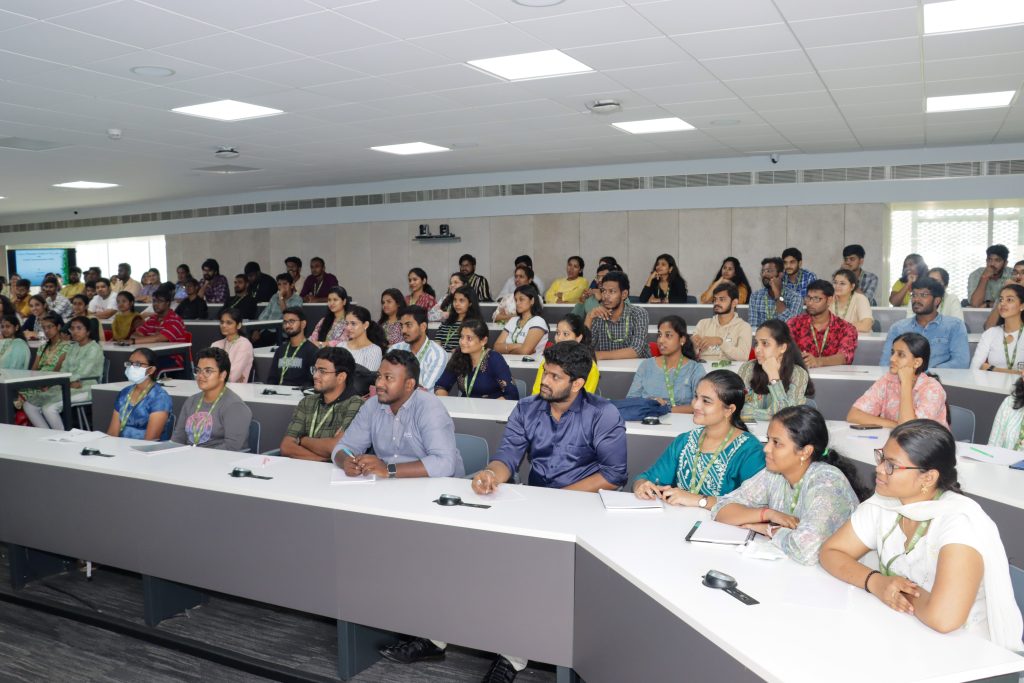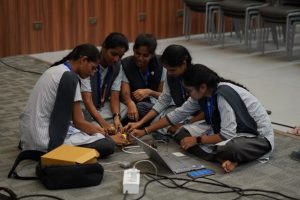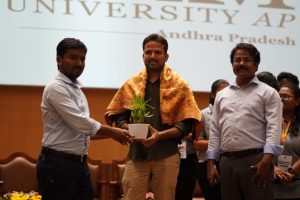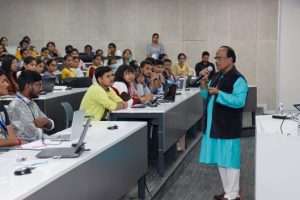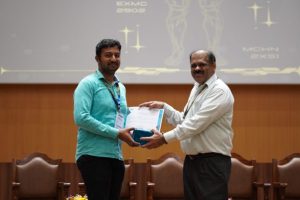All Management Events
- Dr Aftab Alam September 22, 2023
- Professors Deliver a 3-Day Workshop at IARE on NEP Aligned Curricula September 20, 2023
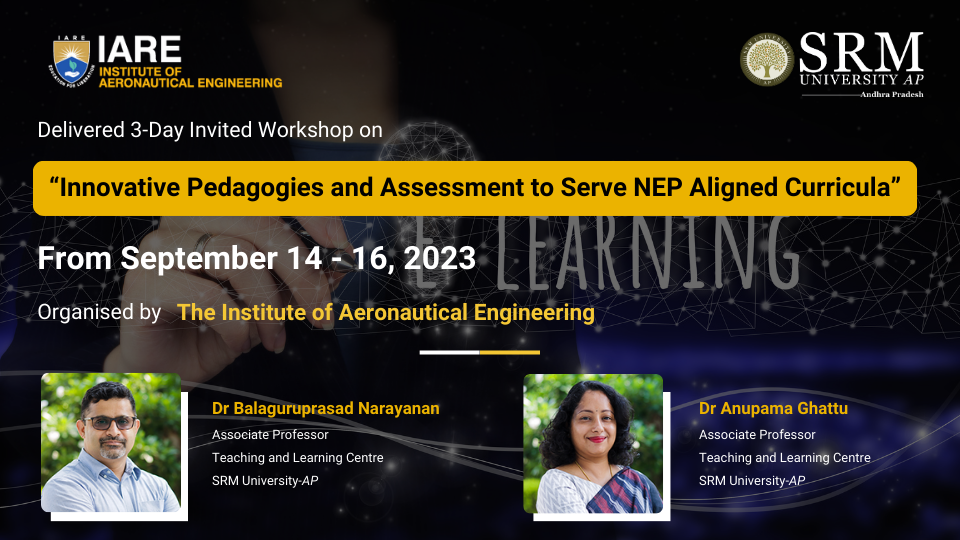
Dr Balaguruprasad Narayanan and Dr Anupama Ghattu, Associate Professors from the Teaching and Learning Centre, SRM University-AP delivered a 3-Day Outcome-Based Teaching & Learning Workshop on “Innovative Pedagogies and Assessment to Serve NEP Aligned Curricula” at the Institute of Aeronautical Engineering (IARE) on September 14-16, 2023. IARE located in Dundigal, Hyderabad is a prestigious autonomous college that offers various undergraduate and graduate programs with 23 years of rich experience in the higher education arena. The 3-day workshop was hosted with the objective of introducing active learning pedagogies and assessment strategies to the faculty of IARE that are engaging, student-centric and aligned with NEP.
The workshop included various sessions on Revisiting existing curriculum to align with the NEP and adopting effective learner-centred approaches to build on their learning; Demonstration of various active learning pedagogies to cater to the needs of the 21st-century learners and how to enhance their learning experience; and a session on the different assessment tools and evaluation techniques that provide an opportunity to assess the learner for further progress.
Dr Anupama addressed and demonstrated the active learning strategies that can be used in the classrooms to encourage student participation, promote higher-order thinking, and increase engagement and accountability of learning. Through her session, she illustrated the importance of assessment and how it must be mapped with the student learning activities to assess their learning and encourage them to work towards their aims. Dr Balaguruprasad discussed the NEP and its guidelines for higher education and how it is important to align the curriculum in line with NEP to facilitate classroom learning that instils 21st-century learning skills in students and how active learning strategies can enhance learning experiences.
Continue reading → - Unlock a World of Diverse Career Opportunities with BA in Liberal Arts September 20, 2023
Thinking Beyond Boundaries: Unravel Your Potential with a BA in Liberal Arts
In today’s rapidly evolving world, selecting the right path for your education can be extremely daunting. The pressure to choose a specialised degree prevails, but have you ever thought if there is another way? The Bachelor of Arts in Liberal Arts proffers an idiosyncratic and revolutionary journey, furnishing students with dynamic skill sets transcending boundaries and unlocking a world of many conventional and unconventional career opportunities.

BA in Liberal Arts promotes critical thinking and nurtures intellectual curiosity. It empowers and encourages candidates to explore multitudes of disciplines, from literature and philosophy to economics and political science. The multidisciplinary approach encourages students to witness the interrelation of the world we inhabit, to commune with different perspectives and, of course, to find advanced solutions to intricate problems.
Flexibility is the hallmark of a degree in Liberal Arts. Candidates have the right and freedom to personalise their education to meet their interests and career goals. By amalgamating BA in Liberal Arts subjects such as Sociology and History or Philosophy and Fine Arts, individuals can come up with an unique blend of expertise that sets them apart in the competitive job market.
There is no denying that employers in the current scenario seek well-versed individuals who can adapt and handle dynamic challenges, making liberal arts graduates highly sought after.
Further, a BA in Liberal Arts polishes essential soft skills that employers seek. Effective communication, teamwork, adaptability, and creativity are ameliorated via this degree programme. Graduates are well-equipped to navigate a rapidly changing job market and lead with the utmost confidence in a world demanding advancement and originality. Hence, if you have a keen interest in Literature and Arts, pursuing BA Liberal Arts would be the best fit.
In the present era, lots of individuals are still perplexed between a Bachelor of Liberal Arts and a Bachelor of Arts. So, let’s take a dig into it.
Bachelor of Liberal Arts Vs Bachelor of Arts
The difference between a Bachelor of Liberal Arts (BLA) and a Bachelor of Arts (BA) degree lies essential in their focus and curriculum. However, both degrees are typically rooted in the philosophy of liberal arts; they offer vivid approaches and opportunities to candidates.
Let’s quickly comprehend the difference between BLA and BA.
Bachelor of Liberal Arts (BLA)
The BLA is typically a multidisciplinary degree allowing students to tailor their own course by merging different subjects from many different domains. It motivates students to dive deep into diverse areas of knowledge and promotes problem-solving skills, critical thinking, as well as creativity.
Bachelor of Arts (BA)
On the other hand, the BA is much more conventional, proffering a wider education in the liberal arts and sciences. It generally incorporates core requirements in subjects such as Literature, History, Social Sciences, Natural Sciences, and Mathematics, giving students a well-structured education.
The BLA offers a more personalised and multidisciplinary approach, whilst the BA gives a balanced and all-inclusive education in the liberal arts and sciences. Deciding between the two solely depends on your career goals, interests, and preferred way of learning.
Career Opportunities After BA in Liberal Arts
Once completing BA Liberal Arts, graduates have a versatile skill set that can open doors to a plethora of opportunities in numerous sectors. Below are some potential job opportunities for liberal arts graduates:
- Communications Specialist
- Content Writer
- Research Assistant
- Human Resources Assistant
- Public Relations Coordinator
- Social Media Manager
- Event Coordinator
These are just a couple of examples, and the possibilities and opportunities are massive. Liberal arts graduates possess the flexibility to adapt and excel in diverse job roles across industries, making them valuable assets in today’s dynamic and ever-changing job market.
However, a key aspect that mustn’t be ignored while taking up BA Liberal Arts is- choosing the right institution or university. Cut to the quick, one of the best universities offering a BA in Liberal Arts is SRM University-AP.
Unleash Your Creative Mind with BA in Liberal Arts Programme at SRM University-AP
The BA in Liberal Arts programme at SRM University-AP stands out from conventional degree programmes, as it empowers and encourages students to think beyond a specific discipline. By combining BA Liberal Arts subjects like Literature, History, Philosophy, Sociology, Fine Arts, and more, students gain a better understanding of the world and its intricacies.
With the supervision of proficient faculty members, candidates are exposed to a lively academic environment promoting innovation as well as independent thought. BA Liberal Arts course equips them not only with analytical but communication skills required to thrive in an ever-evolving global landscape.
At SRM University-AP, the focus is not just on books and evaluations but on experiential learning via interactive workshops, internships, and community projects, candidates implement their knowledge in real-world scenarios, making learning an engaging and practical experience.
Additionally, the University’s high-tech infrastructure and dynamic student community make sure to provide students with enriching campus life. Also, cultural events, clubs, and sports activities complement the academic curriculum, allowing students to build holistically.
In a Nutshell
BA Liberal Arts is not just a degree but an enlightening journey of self-discovery and empowerment. Commencing the liberal arts path enables candidates to unleash their potential, transcend conventional boundaries, and embrace the richness of a dynamic, interlinked world. So, if you want to have a transformative education preparing you for a lifetime of learning, growth, and impactful contributions, pursuing BA in Liberal Arts from SRM University-AP is your key to success
Continue reading → - Dr Chinmoy Das September 20, 2023
- Dr Thirupathaiah Setti September 19, 2023
- Dr Akuthota Sankar Rao September 16, 2023
- Mr Boddu L V Siva Rama Krishna September 16, 2023
- Dr Pulak Kar September 15, 2023
- An Enriching Session on Cracking Job Interviews September 15, 2023
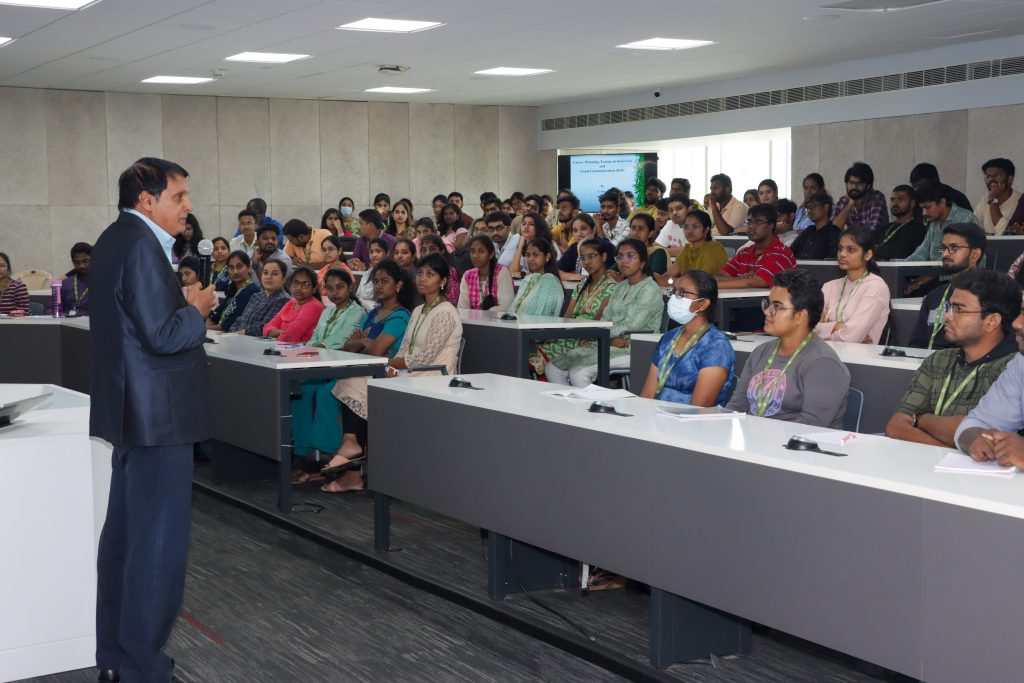
The Paari School of Business successfully concluded its session on career development. Mr. Suresh S, a seasoned HR professional with years of experience, engaged students with informative segments on career planning, acing job interviews, and enhancing communication skills.
During the career planning segment, attendees were reminded of the critical importance of completing their courses and were enlightened about the more rigorous elimination processes often found in larger companies. The seminar emphasised the need for clarity in one’s career goals, whether it involves pursuing higher studies, venturing into entrepreneurship, or exploring international opportunities. The resounding message was to “dream big” and strive for ambitious career aspirations.
The interview segment of the seminar provided illuminating insights into the rapid evaluation process that candidates face during job interviews. The seminar also delved into Maslow’s Theory of Management, emphasising the significance of mastering the fundamental principles. A major takeaway from the event was the emphasis on merit over recommendations, highlighting the importance of proving one’s capabilities through skills and qualifications.
The seminar also equipped attendees with practical tips for interview success. These included guidance on dressing appropriately, avoiding squeaky shoes, mastering the art of tying ties, punctuality, and conducting thorough research about the prospective employer. Participants were encouraged to create clear and concise resumes, carry extra copies of their resumes and testimonials, and ensure that their references were in order. The event underscored that the first impression often leaves a lasting mark, making preparation and presentation crucial.
Effective communication skills were another key focal point, with an emphasis on articulating strengths and weaknesses concisely and convincingly. The seminar was a comprehensive guide for attendees, equipping them with the knowledge and skills needed to navigate the complex job market successfully.
Continue reading → - Robotrix: A Stepping Stone in the Field of Robotics September 15, 2023

IndustreeOwl and Home of Leaders, Directorate of Entrepreneurship and Innovation conducted a 2-day experiential Hands-on workshop on Robotics named ROBOTRIX on September 05 and 06, 2023, in collaboration with OSSEB, a Hyderabad-based company focused on providing students with relevant skillset according to industry demands. The workshop witnessed the presence of Mr Mohammad Abdul Khayyum, Chief Executive Officer of OSSEB, and Mr Ashish Kumar, who assumed the role of mentor for the two-day event. The guest mentors attended the workshop on behalf of OSSEB, signifying their active engagement and commitment to the workshop’s primary objective to provide students with essential knowledge as a crucial stepping stone for their future endeavours.
The workshop was conducted on the topic “Hands-on Experience on Android Controlled Robotics and Bluetooth Communications”. Students were encouraged to develop their own robots that could be controlled via their Android Phone’s Bluetooth. 139 students registered for the workshop out of which 122 people attended the 2-Day hands-on workshop with many participants registering on-spot. The students were eager to participate and learn about Robotics. Out of 122, almost 50 per cent of the participants were from the NRI Institute of Technology, Vijayawada.
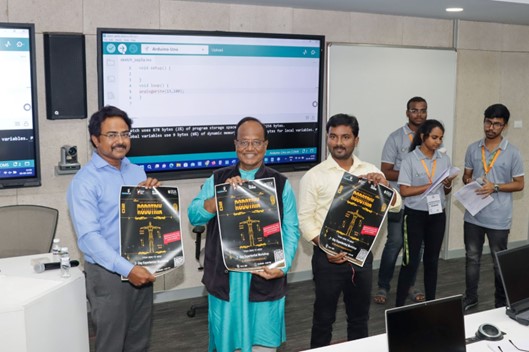
The Workshop also included sessions on the basics of electronics and robotics where students were made to understand the concepts like Flow of Current in a battery, Motors, etc. along with the laws of Robotics and their applications. Insight into how, in the near future Robotics will ally with Artificial Intelligence to give a new shape to the world, was also discussed. This was followed by a session on hands-on activities where participants were formally instructed in the intricacies of programming the robot to facilitate its operational functionality and how to connect to the Robot with the help of the kit provided by OSSEB with their Code.
An Eminent Guest lecture featuring Shri J A Chowdhury, former ISRO scientist, Technological Leader and innovator who has been contributing to the development of the Indian IT industry for more than 35 years was conducted on the grand occasion of Teacher’s Day. He shared his professional experience including his understanding of Robotics and how it will be pivotal in shaping the future. Shri J A Chowdhury along with Mr Udayan Bakshi, Associate Director and Mr Sundhar Singh, Manager-Outreach, Directorate of Entrepreneurship & Innovation inaugurated the Robotrix poster symbolising this momentous Workshop.
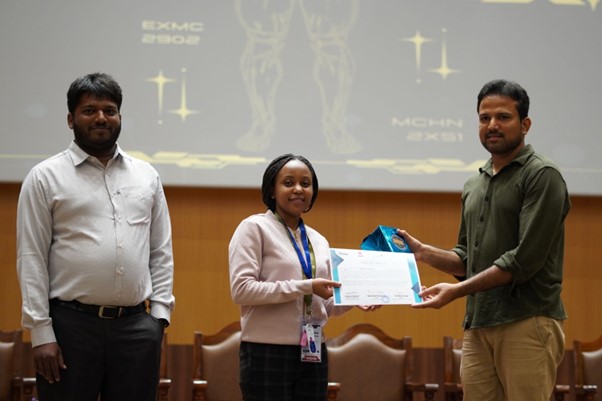
A Presentation Competition was spontaneously conducted by the IndustreeOwl team aimed at actively involving the students and fostering their practical application of the newly acquired knowledge. Pallavi Madala and Fadzai Ethel Muchina from SRM University-AP secured the first and second prize respectively.
The second day saw a continuation of hands-on training where participants were taught to develop the code for controlling the movement of the Robot. They were also taught about Bluetooth Communications and were urged to install an application in their phone which will be pivotal in controlling the Robot. The session was followed by a Quiz Competition that saw the participation of more than 100 students. Yaswanth Dhulipalla from SRM University-AP bagged the first prize, whereas Saikeerthi Aluri and Punuru Varsha Reddy from SRM University-AP won the second and third prizes respectively.
The event successfully concluded with a speech and vote of thanks by Mr Udayan Bakshi where he urged the students to continue moving forward in their Robotics journey with the help of the kits and the mentors from OSSEB. He also felicitated the guests and mentors from OSSEB and the team of IndustreeOwl for the smooth conduction of the Workshop.
The workshop has not only met but exceeded its objective of imparting students with a foundational understanding of Robots and Robot Design. This newly acquired knowledge will undoubtedly serve as a solid stepping stone for them in their future endeavours, equipping them with valuable skills and insights that will open up exciting opportunities and possibilities in the world of robotics and design.
Continue reading →


